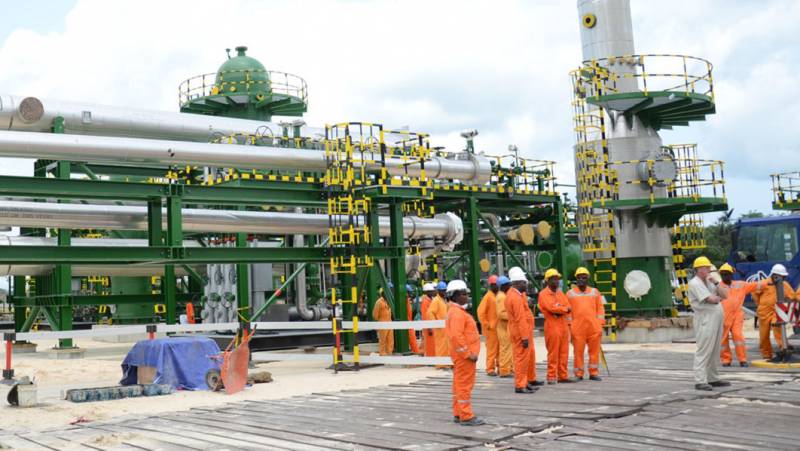Three years after the discovery of oil in Northern Nigeria, President Muhammadu Buhari recently flagged off crude oil production in Kolmani, a borderline area between Bauchi and Gombe states.
The discovery in Kolmani reportedly has over 1 billion barrels of oil reserves and 500 billion cubic feet of gas. Reports have indicated that there is potential for more. This discovery is coming at a time when Nigeria has lost its place as Africa’s largest oil producer and is now ranked fourth on the continent behind Angola, Libya, and Algeria. Also, Nigeria’s production capacity hovers below 1 million barrels per day (BPD) despite OPEC’s projection of 2 million BPD and a production capacity of 2.5 million barrels per day – a figure the country has struggled to achieve in the last 10 years. Oil was first discovered in commercial quantity in Oloibiri, present-day Bayelsa State, in 1956. Since then, only a few states in the country are oil-producing states, with none from the northern part of the country. This discovery means some states in the north can now be termed “oil-producing states”.
Beyond this, what could this discovery mean for the North?
Possible Restructuring: Recently, the Nigerian political space has been awash with the word “restructuring” and this has led to diverse opinions on the political implications for the Nigerian space and most importantly, the economy.
- Restructuring can be said to entail the devolution of power from a central government to states or subordinates. In Nigeria, it’s more relatable to the Federal Government giving each state or region the power to control its resources, while the Federal Government focuses on foreign policy, and acts as an overseer, amongst others.
- The clamor for restructuring is not new to the Nigerian space. And the discovery of oil in the North could bring this back to the fore. With this discovery, the North can now boast as a region that does not only contribute to agriculture but also contributes to the oil and gas sector. Possibly the Northern economy can accept restructuring now?
Derivation Fund: The discovery of oil is expected to create a new request by the North (states concerned) to be included among states eligible to receive 13% oil derivation funds.
- According to the Nigerian constitution, states, where oil is produced are entitled to 13% of the money accrued from oil exportation in the country. The funds are given to lessen the effects of oil exploration in the community and states and also for the development of the areas oil is produced. These funds are however shared based on the value of oil produced in the state.
- The discovery of oil in the north now means states, where oil is produced can now push to be included among states to receive oil derivatives, and this could also mean a potential increase in the percentage given to oil-producing states. According to reports, in 2021, nine oil-producing states shared N450bn through the 13% derivation agreement.
Poverty alleviation: The discovery of oil could potentially bring prosperity to the north, thus drastically reducing the poverty rate in the region.
- According to reports, the poverty in Nigeria has exceeded the projection of the World Bank, with the National Bureau of Statistics (NBS) reporting that 133 million Nigerians are living in multi-dimensional poverty.
- A further review showed that 65% of poor people which represents 86 million people live in the north. The level of poverty based on states also shows this, as there are four northern states in the top five poor states in the country.
- The discovery of oil in the north is expected to generate N32 trillion. The funds, if properly put to use, could pull millions of people out of poverty in the north; this will not only reduce the poverty level in the north but also in the country at large.
Kaduna Refinery: Before the discovery of oil in the north, there were concerns about the Kaduna Refinery. Commissioned in 1980, the refinery has been moribund for years due to several reasons, including the distance between its location and the Niger Delta where most of Nigeria’s crude oil is extracted.
- Following the discovery of oil in Kolmani, the refinery could now be utilised to its fullest capacity. Last month, the Federal Government signed a Memorandum of Understanding with South Korea’s Daewoo to rehabilitate the refinery.
- During the first phase of the exploration, up to 120,000 BPD is expected to be produced. This will boost Nigeria’s daily production capacity.




